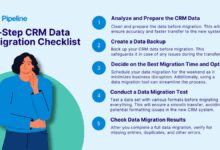Crm system integrator: 5 Powerful Reasons to Hire a CRM System Integrator Today
Thinking about upgrading your customer relationship game? A CRM system integrator could be the ultimate secret weapon your business didn’t know it needed. Let’s dive into why this decision might just transform your operations.
What Is a CRM System Integrator?

A CRM system integrator is a specialized professional or firm that connects your Customer Relationship Management (CRM) software with other business systems like marketing automation, ERP, e-commerce platforms, and customer support tools. Their primary goal is to ensure seamless data flow across all departments, eliminating silos and boosting efficiency.
Defining the Role of a CRM Integrator
The role of a CRM system integrator goes beyond simple software installation. These experts analyze your existing tech stack, identify integration gaps, and implement solutions that align with your business goals. They act as both technical architects and strategic advisors.
- Assess current software ecosystems
- Design integration roadmaps
- Implement APIs and middleware solutions
“A CRM integrator doesn’t just connect systems—they connect people, processes, and profits.” — Tech Strategy Review, 2023
Key Responsibilities and Deliverables
When you hire a CRM system integrator, you’re not just buying a service—you’re investing in measurable outcomes. Their deliverables often include data migration plans, API configurations, user training, and post-integration support.
- Data mapping and cleansing
- Custom workflow automation
- Security and compliance audits
Why Your Business Needs a CRM System Integrator
Many companies attempt DIY CRM integrations, only to face data inconsistencies, workflow breakdowns, and frustrated teams. A professional CRM system integrator prevents these pitfalls by ensuring technical precision and strategic alignment.
Eliminating Data Silos Across Departments
One of the biggest challenges in modern businesses is fragmented data. Sales, marketing, and customer service often operate on separate platforms, leading to duplicated efforts and missed opportunities. A CRM system integrator bridges these gaps.
For example, integrating your CRM with your email marketing platform allows sales teams to see which campaigns a lead has engaged with. This context improves personalization and conversion rates. According to Gartner, organizations with integrated CRM systems report 36% higher customer retention.
Improving Operational Efficiency
Manual data entry is not only time-consuming but error-prone. A CRM system integrator automates data synchronization between systems, reducing human intervention and increasing accuracy.
- Automated lead capture from web forms
- Synchronized customer updates across platforms
- Real-time inventory visibility in CRM for sales teams
This efficiency translates into faster response times, better customer experiences, and lower operational costs.
Top 5 Benefits of Hiring a CRM System Integrator
The value of a CRM system integrator extends far beyond technical setup. Here are five powerful benefits that can transform your business.
1. Seamless Integration with Existing Tools
Whether you’re using Salesforce, HubSpot, or Microsoft Dynamics, a CRM system integrator ensures your CRM works harmoniously with tools like Slack, Zoom, Shopify, or QuickBooks.
They use APIs, webhooks, and integration platforms like MuleSoft or Zapier to create bidirectional data flows. This means when a deal closes in your CRM, your accounting system automatically creates an invoice—no manual input required.
2. Customization for Unique Business Needs
Every business has unique processes. A CRM system integrator tailors the integration to match your workflows, not the other way around.
- Custom fields and objects synced across systems
- Role-based data access and visibility
- Automated approval processes for high-value deals
This level of customization ensures that your CRM becomes a true reflection of how your business operates.
3. Enhanced Data Accuracy and Reporting
Integrated systems mean consistent data. When your CRM, marketing, and sales tools share the same information, your reports become more accurate and actionable.
For instance, a unified dashboard can show customer acquisition cost (CAC), lifetime value (LTV), and conversion rates—all pulled from synchronized data sources. This empowers leadership to make data-driven decisions with confidence.
4. Faster Time-to-Value
Attempting integration in-house can take months of trial and error. A CRM system integrator accelerates the process with proven methodologies and pre-built connectors.
Many integrators offer phased rollouts, allowing businesses to go live with core functionalities in weeks rather than months. This rapid deployment means quicker ROI and faster improvements in customer engagement.
5. Ongoing Support and Scalability
A good CRM system integrator doesn’t disappear after launch. They provide ongoing monitoring, troubleshooting, and scalability planning.
As your business grows, your tech stack will evolve. Whether you’re adding new offices, launching products, or entering new markets, your integrator ensures your CRM ecosystem scales with you.
How to Choose the Right CRM System Integrator
Not all CRM system integrators are created equal. Choosing the right partner requires careful evaluation of their expertise, experience, and approach.
Check Certifications and Technical Expertise
Look for partners certified by major CRM platforms like Salesforce, HubSpot, or Microsoft. These certifications indicate formal training and up-to-date knowledge.
- Salesforce Certified Integration Architect
- HubSpot Solutions Partner
- Microsoft Dynamics 365 Integration Specialist
Certified integrators are more likely to deliver reliable, secure, and scalable solutions.
Review Case Studies and Client Testimonials
Ask potential CRM system integrators for case studies in your industry. A healthcare provider has different needs than a retail brand, so industry-specific experience matters.
Look for evidence of successful implementations, measurable results (e.g., 40% faster lead response time), and long-term client relationships. Sites like Capterra and G2 offer verified user reviews that can guide your decision.
Evaluate Communication and Project Management Style
Technical skills are crucial, but so is communication. The best CRM system integrators keep you informed with regular updates, clear timelines, and transparent pricing.
Ask about their project management tools (e.g., Jira, Asana) and whether they assign a dedicated project manager. A structured approach minimizes delays and misunderstandings.
Common Challenges in CRM Integration (And How Integrators Solve Them)
Even with the best intentions, CRM integration projects can run into obstacles. A skilled CRM system integrator anticipates and resolves these issues proactively.
Data Migration and Cleansing
Moving data from legacy systems to a new CRM is risky. Incomplete, duplicate, or outdated records can corrupt your database.
A CRM system integrator uses data profiling tools to assess quality, removes duplicates, standardizes formats, and maps fields accurately. They also perform test migrations to ensure integrity before going live.
API Limitations and Rate Limits
Not all platforms offer robust APIs. Some have strict rate limits or lack endpoints for critical functions.
Experienced integrators work around these limitations using middleware, batch processing, or custom scripts. They also monitor API usage to prevent throttling and downtime.
User Adoption and Training Gaps
Even the best-integrated CRM fails if employees don’t use it. Resistance to change is a common barrier.
A CRM system integrator often includes change management in their services—offering role-based training, user guides, and post-launch support to drive adoption.
CRM System Integrator vs. In-House IT: Which Is Better?
Some companies consider handling CRM integration internally. While this might seem cost-effective, it comes with trade-offs.
Pros and Cons of In-House Integration
Handling integration in-house gives your team full control and potentially lower upfront costs. However, internal teams may lack specialized integration experience.
- Pros: Direct control, no vendor dependency
- Cons: Limited expertise, longer timelines, higher risk of errors
Internal IT teams are often already stretched thin, making it difficult to dedicate sufficient time to complex integration projects.
Advantages of Hiring a Professional CRM System Integrator
A dedicated CRM system integrator brings focused expertise, proven frameworks, and access to advanced tools.
- Specialized knowledge of CRM ecosystems
- Faster deployment with minimal disruption
- Post-launch support and optimization
While there’s a cost involved, the long-term ROI in efficiency, accuracy, and scalability far outweighs the investment.
Future Trends in CRM Integration
The role of the CRM system integrator is evolving alongside technology. Staying ahead of trends ensures your business remains competitive.
AI-Powered Integration and Automation
Artificial intelligence is transforming how CRM systems interact with other platforms. AI can predict integration needs, auto-map fields, and detect anomalies in data flow.
For example, AI-driven tools can suggest optimal workflows based on historical data, reducing manual configuration. Platforms like Salesforce Einstein are already embedding AI into integration processes.
Low-Code and No-Code Integration Platforms
Tools like Microsoft Power Automate and Zapier allow non-technical users to create integrations. However, complex environments still require a CRM system integrator to ensure stability and security.
The future lies in hybrid models—where integrators design the architecture, and business users make minor adjustments without coding.
Increased Focus on Data Privacy and Compliance
With regulations like GDPR and CCPA, data handling during integration must be compliant. A CRM system integrator ensures encryption, consent tracking, and audit trails are built into the integration design.
They also help document data flows for compliance reporting, reducing legal and financial risks.
What does a CRM system integrator do?
A CRM system integrator connects your CRM software with other business applications, ensuring seamless data flow, automating workflows, and improving overall system efficiency. They handle technical setup, data migration, customization, and ongoing support.
How much does it cost to hire a CRM system integrator?
Costs vary based on project complexity, ranging from $5,000 for basic integrations to $50,000+ for enterprise-level implementations. Many integrators offer fixed-price packages or hourly rates, typically between $100–$250/hour.
Can I integrate CRM myself using tools like Zapier?
Yes, for simple tasks like syncing emails or contacts. However, for complex business logic, data cleansing, security, and scalability, a professional CRM system integrator is recommended to avoid errors and ensure long-term success.
How long does CRM integration take?
Simple integrations take 2–4 weeks, while complex projects involving multiple systems and custom development can take 3–6 months. A CRM system integrator provides a detailed timeline based on your specific needs.
Which CRM platforms do integrators typically support?
Most CRM system integrators support major platforms like Salesforce, HubSpot, Microsoft Dynamics 365, Zoho CRM, and Pipedrive. They also integrate with ERP, marketing, e-commerce, and support systems.
Choosing the right CRM system integrator is a strategic move that can redefine how your business manages customer relationships. From eliminating data silos to enabling AI-driven insights, their expertise ensures your CRM becomes a powerful engine for growth. Whether you’re a mid-sized company or a large enterprise, investing in professional integration delivers faster results, better data, and long-term scalability. Don’t leave your CRM’s potential to chance—partner with experts who know how to unlock its full power.
Further Reading:



